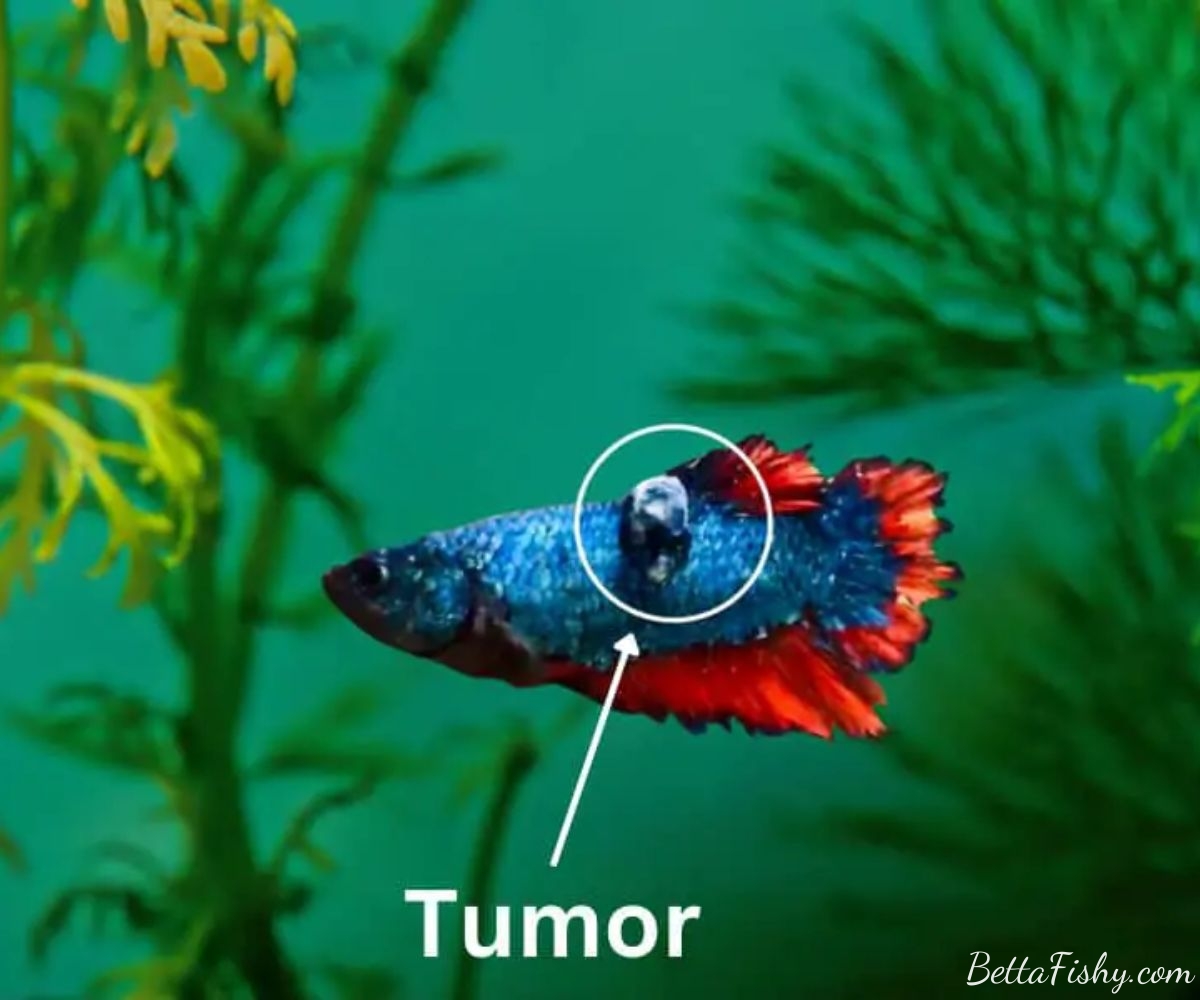Introduction
Tumors are abnormal growths of tissue that can develop in betta fish just like in other animals. While the word “tumor” may be scary, not all tumors in bettas are cancerous. Some are benign lumps that may not progress or harm the fish.
However, malignant tumors can also occur in bettas. These abnormal growths invade healthy tissue and have the potential to spread. Therefore, it’s important for betta owners to monitor their fish closely and be able to identify tumor symptoms early.
The goal of this article is to provide a comprehensive guide on the causes, symptoms, diagnosis and treatment of tumors in betta fish. By understanding how to identify, treat and prevent tumors, you as a betta owner will be better equipped to care for your fish’s health.
Common Causes of Tumors in Betta Fish

There are several common causes of tumors in betta fish:
Genetics – Some betta fish are genetically prone to developing tumors due to selective breeding. Tumors can be passed down from parent fish to offspring.
Bacteria/viruses – Infections from bacteria like Mycobacterium or viruses can cause abnormal tissue growths. Columnaris bacterial disease is known to cause raised white lumps on bettas.
Water quality – Poor water conditions, high nitrates, ammonia spikes, and dirty tanks can lead to infections and weakened immune systems, increasing the risk of tumors.
Injuries – Repeated trauma, wounds, or fin damage can prompt excess scar tissue formation that may turn into tumors with time.
Age – Older bettas are more prone to developing growths and cancerous tumors.
Constipation vs tumor differences – While constipation causes a raised lump on the betta’s abdomen, tumors often occur asymmetrically on fins, head or body. Constipation lump sizes reduce after passing waste whereas tumors persist.
Common Symptoms
The most common symptom of a tumor in betta fish is an abnormal lump or swelling on the body. According to FishLab, tumors can appear as raised, cauliflower-like masses that stand out from the body or fins. They may be white, red, black or other colors. Tumors can develop anywhere on the body but are often seen around the mouth, fins, or stomach region.
The location of the lump on your betta’s body can provide clues about the type of tumor. For example, masses near the mouth may indicate squamous cell carcinoma, while those on the body or fins are more consistent with fibropapillomas, according to BettaSource.
In addition to lumps and bumps, changes in your betta’s behavior can signal an underlying tumor. Affected fish may become lethargic and lose their appetite as the tumor progresses. They may isolate themselves from tankmates or spend more time resting at the bottom of the tank. Abnormal swimming patterns are also common.
According to the Japanese Fighting Fish website, internal tumors can cause more diffuse symptoms like bloating, buoyancy issues, and problems swimming or eating. Since they are harder to detect, it’s important to watch for subtle behavioral changes in your betta.
Accurate Diagnosis of Betta Fish Tumors from a Veterinarian

If you notice any concerning symptoms or growths on your betta fish, the next step is to get a proper diagnosis from a veterinarian. This will allow you to determine if the tumor is benign or malignant.
The vet will first do a physical exam, closely inspecting the appearance and location of the tumor on your betta’s body. They will note details like the shape, texture, color, and whether it appears encapsulated in a membrane or invasive into healthy tissue. This visual exam can provide clues as to whether it is a benign mass or malignant tumor.
However, the only way to definitively diagnose cancer is through a biopsy. This involves surgically removing all or part of the tumor for analysis. The cells are examined under a microscope by a veterinary pathologist to determine if they are cancerous or not. Based on the biopsy results, the tumor can be staged and graded to customize treatment.
While a biopsy requires anesthesia and surgery, it is vital for determining the right course of action for treating your betta fish. Benign masses may only need monitoring or removal. But malignant tumors require an accurate diagnosis, as unsuccessfully treating cancer can allow it to further invade the body. Consult an experienced fish veterinarian if your betta develops any lumps or growths to get an accurate diagnosis.
Treatment when encountering tumors in Bettas fish

Treatment options for tumors in betta fish depend on whether the tumor is benign or malignant.
For benign tumors, observation is sometimes recommended to see if the tumor grows. If it affects the fish’s quality of life, surgery may be performed to remove the tumor. However, surgery is high-risk in delicate betta fish and may result in fatality. Surgery should only be attempted by an experienced fish veterinarian. The survival rate is estimated to be less than 50%.
Unfortunately, there are no effective treatment options for malignant or cancerous tumors in betta fish. Once diagnosed, euthanasia is typically recommended to prevent suffering.
Regardless of tumor type, supportive care can help improve quality of life. Providing clean, high-quality water is essential. Bettas with tumors should be kept in a heated, filtered 5+ gallon tank with frequent water changes. A nutritious diet with live or frozen foods can also help support the immune system.
While options are limited, focus should be on reducing stress and discomfort in betta fish diagnosed with tumors whenever possible.
How to Prevent Tumors in Betta Fish?
There are several ways you can help prevent tumors from developing in your betta fish:
Selective Breeding: Some betta fish are genetically predisposed to developing tumors. Avoid purchasing bettas from breeders who have a history of fish developing tumors. Instead, select fish from reputable breeders who focus on breeding healthy fish.
Proper Nutrition: Feeding your betta a varied, nutritious diet may help prevent tumors. Make sure to feed a high quality pellet and supplement with frozen or live foods like brine shrimp, bloodworms and daphnia. Malnutrition is thought to potentially contribute to tumor development.
Maintain Water Quality: Perform regular water changes and test water parameters frequently. Poor water quality stresses the immune system, allowing diseases like bacterial or viral infections to take hold, which could lead to tumors. Always keep ammonia, nitrite at 0 ppm and nitrate under 20 ppm.
See more: How to clean a betta fish tank
Avoid Injuries: Any injury to your betta could potentially become infected and turn into an abscess or tumor. Be sure decor is smooth and tanks are covered. Don’t allow tankmates to nip fins. Monitor water parameters to avoid fin rot. Quickly treat any injuries with antiseptic and clean water.
Conclusion
In summary, tumors in betta fish can be concerning but are not always malignant. By being aware of the potential causes, like genetics, bacteria, and water quality, you can take steps to prevent tumor development. Regularly monitoring your betta for symptoms like raised bumps, lethargy, and appetite changes allows for early detection and diagnosis. While malignant tumors may require euthanasia, benign growths can often be managed with surgery or observation.
To keep your betta healthy and tumor-free, focus on selective breeding, optimal nutrition, clean water, and avoiding injuries. With proper care and husbandry, tumors are less likely to occur. If you notice any worrisome signs in your betta, seek veterinary advice right away for the best chance of successful treatment.
For more information about betta tumor causes, diagnosis, and care, consult your exotic pet veterinarian. There are also helpful online resources like discussion forums where fellow aquarium owners can share their experiences and advice.


